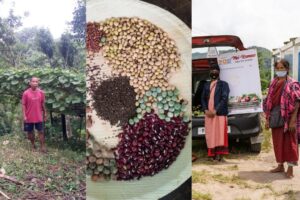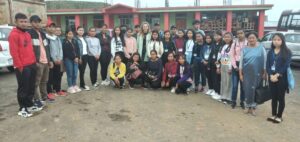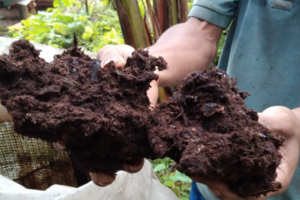Meet Kong Thirda Khasain, a dedicated custodian farmer from Nongwah, East Khasi Hills whose commitment to promoting agrobiodiversity and sustainable farming practices spans over the past nine years. As an active member of the Biodiversity Management Committee (BMC), Kong Khasain plays a crucial role in her community, embodying the values of traditional farming and sustainable agriculture.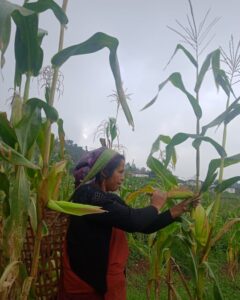
Kong Khasain’s journey began in 2015 when she transitioned from inorganic to organic farming. Over the years, she has developed a thriving ecosystem of organic produce, rooted in traditional farming practices. Her dedication to soil and pest management has been instrumental in promoting sustainable agriculture in her village and beyond.
For soil improvement, Kong Khasain relies solely on natural materials such as animal waste, natural biomass, and plant residues. She also makes her compost, including Vermi and Berkeley compost, and employs techniques like tillage management, mulching, crop rotation, and multi-cropping. Her pest management approach is equally eco-friendly, utilising bio-pesticides from locally sourced ingredients such as water, chilli, garlic, tobacco, and soap. This method ensures the protection of her crops without harming humans, wildlife, or promoting pest resistance.
Kong Khasain’s farm is a testament to biodiversity. She grows a wide variety of seeds, including tubers, vegetables, fruits, and rice. Notably, she has revived extinct food crops such as finger millet and foxtail millet through seed exchange programmes, and now shares these valuable seeds with farmers in her community. Her kitchen garden boasts around 43 species of food plants, further highlighting her commitment to preserving local biodiversity.
Kong Khasain is not only a farmer but also a community leader. She actively participates in training sessions, workshops, and meetings organised by various organisations and departments in her village. Her ability to influence social change is evident in her initiatives, such as setting up a nursery with around 1000 saplings over the past two years. These saplings are transplanted to community forests and water sources, enhancing water retention and quality.
Her efforts have had a significant impact on her community. Ten farmers have transitioned from inorganic to organic farming, adopting composting and bio-pesticide practices. Additionally, the Agroecology Learning Circle (ALC) members source organic vegetables from her for the weekly market in Tyrsad. Her advocacy for reviving and promoting indigenous food systems has been acknowledged by the village council, further cementing her role as a community leader.
Kong Khasain’s work is part of a larger initiative supported by NESFAS. Since its inception, NESFAS has collaborated with Indigenous Peoples in Meghalaya and Nagaland to strengthen local food systems and biodiversity. The “Protection of forests in Meghalaya through participatory, gender-centric, and equitable approaches” project, launched in June 2022, aims to document and sustain local biodiversity through the People’s Biodiversity Register (PBR).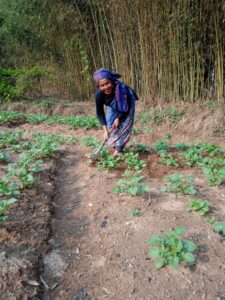
This project, supported by the Nature Conservancy (TNC) and the Meghalaya State Biodiversity Board, has mobilized 71 BMCs to document local biodiversity and traditional knowledge. Kong Khasain’s work exemplifies the impact of dedicated individuals in promoting sustainable agriculture and preserving biodiversity, and she stands out in this sector. The true impact of Kong Khasain’s work is seen in the positive changes she has brought to her community and the inspiration she provides to others as an active BMC member. Her story is a testament to the power of traditional knowledge, sustainable practices, and community engagement in preserving our natural world.

